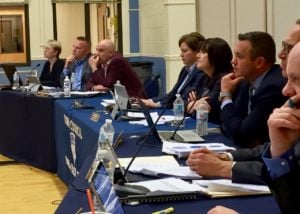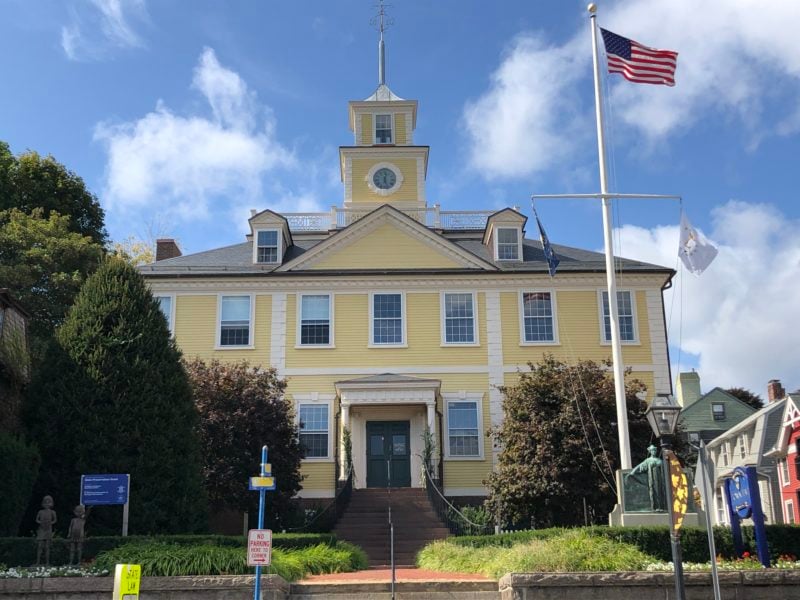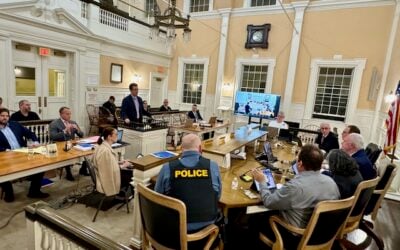By Elizabeth F. McNamara
The town ended fiscal year 2019 with a $700,000 deficit, according to the audit report presented to the Town Council and School Committee at a virtual meeting Monday night. The deficit was not unexpected, since the previous Town Council had baked a $1 million deficit into the FY2019 budget. The idea was to freeze the tax rate by taking $1 million out of the town’s surplus to balance the budget (read more HERE).

The Town Council meeting June 4, 2018, when they approved the FY2019 budget in a 4-1 vote (then Councilman Mark Schwager voting no).
The town ended the year $300,000 ahead of what had been budgeted. The money to make up the difference will come out of the town’s surplus, or rainy day fund. East Greenwich has about $6 million in surplus, around 10 percent of its budget. Best practice is anywhere between 8 percent and 15 percent, said Paul Dansereau of the audit firm Baxter Dansereau Monday night.
Dansereau noted, however, that using surplus funds to fund the operating budget in normal times can come back to haunt you if things turn bad.
“There are circumstances where something comes up that you didn’t budget for and you could have to eat into your fund balance and that can make bonding agencies very nervous,” he said.
“You mean like a virus?” said Town Councilor Caryn Corenthal, referring to COVID-19 and the looming budget crisis due to the economic shutdown and ensuing job loss. Town Manager Andrew Nota has warned of difficult times ahead – his budget for FY2021 is due Friday.
The other news out of Monday night’s audit report was the school department’s overspending of its bond revenue by $396,000 in FY2019. According to town Finance Director Tricia Sunderland, the school department spent $555,531 in bond money for capital projects in FY2019 (specifically, a new roof for Hanaford), but it had only $158,851 available from the $52 million bond originally approved by the town in 2008 to build the new Cole Middle School.
The finance director in 2018 was Linda Dykeman (who was also the finance director of the school district during a short-lived consolidation of the two departments). She resigned in November 2018 but left behind a “work paper” on the $52 million bond. Sunderland said the work paper was inaccurate, which may have led the school district to think it had more available bond money than it had.
“I’m sure the School Committee was assuming the school finances were being handled,” said Sunderland on Tuesday. She took over as town finance director in April 2019.
“The finance manager [Gina Krokowski] is reconciling the whole bond now so we have a full accounting of it so we can be confident that this is exactly what our records show,” Sunderland said.
“Somebody based an expense on wrong information,” said Town Manager Nota. “It was a legitimate school expense. It was processed through RIDE [the state Dept. of Education] and we’re getting our proper reimbursement. All we’re talking about is the $396,000 should have come from another source.”
If you value what you find on East Greenwich News, consider making a donation. We are a 501(c)(3). Use the button below or, if you’d rather mail something, send it to EG News, 18 Prospect St., E.G., RI 02818. Thanks – every contribution helps.






 Subscribe
Subscribe
Re: Mr. Dansereau’s comment about not using surplus funds in case something might turn bad. I submit that things ARE already bad with so many out of work and their own finances at risk. Use the money. It is, after all, our money.
Hi Judy,
Mr Dansereau’s comments about not using surplus funds to balance the budget referred to the 2019 budget. At that time the economy was strong and to use reserve funds in 2019 was unsound, precisely because of the need to preserve reserve funds so they are available in the event of a severe economic downturn, like we are seeing at present.
Mark Schwager
President, East Greenwich Town Council
As the due date of the audit report was December 31, 2019, was there any discussion as to why it was filed so late?
Good question. Checking.
Joe, here’s what Town Manager Nota wrote to me about the delayed audit:
There were numerous inconsistences in this and prior budgets that needed to be reconciled internally before the final audit could be produced. We feel more confident today that FY2019 Audit is the most accurate the Town has had to rely on in several years. As you know, it is the Auditors responsibility to express opinions on the Town’s financial statements, not develop them. As another example, similar to the Bond discussion of recent days, in the FY 2017 Audit appears in the Capital Outlay line items, $959,027, that has been reported for several years, but did not exist in reality. It was an error that prompted some to believe that funding existed for the replacement of the high school turf carpet. This was completely erroneous but carried forward year after year, perpetuating that conversation. The Audit is only as good as the information that the Town enters.
We are slowly getting to a good place with our financials, although are not yet to the point that all of our reporting is up to date, based on the emergency environment we now find ourselves and other ongoing priorities. By the close of the FY2021 year we should be in a much better position.
I was appointed to the Finance Committee of the School Committee as a community member in 2018 and served with School Committee members Jeff Dronzek and Michael Fain. All of us had concerns about the School Department finances and the budget process, and we were frustrated by a lack of detailed information. I can say the situation is much improved with administrators on both the town and school side who are committed to getting it right and making the process as transparent as possible.
Eugene Quinn
member, East Greenwich School Committee
co-director, Actuarial Mathematics Program, Stonehill College